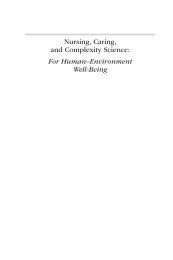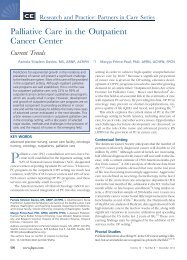Expertise in nursing practice : caring, clinical judgment - Springer ...
Expertise in nursing practice : caring, clinical judgment - Springer ...
Expertise in nursing practice : caring, clinical judgment - Springer ...
Create successful ePaper yourself
Turn your PDF publications into a flip-book with our unique Google optimized e-Paper software.
4 <strong>Expertise</strong> <strong>in</strong> Nurs<strong>in</strong>g Practice<br />
account of the nature ofthe methods it applies” (Plato, 1937, p. 465a).<br />
It “goes straight to its end, and never considers or calculates anyth<strong>in</strong>g”<br />
(p. 465a). Socrates holds that such <strong>in</strong>tuitive abilities are not crafts at all<br />
and that experts <strong>in</strong> these doma<strong>in</strong> have no knowledge but a mere knack.<br />
This would apply to <strong>in</strong>tuitive experts from basketball players to chess<br />
masters and virtuoso musicians, all of whom are unable to articulate<br />
rational pr<strong>in</strong>ciples based on atheory to expla<strong>in</strong> what theydo.<br />
Socrates thought that these sorts of experts were really not experts<br />
at all but just clever crowd pleasers operat<strong>in</strong>g on hunches and lucky<br />
guesses. Only experts like doctors, whocould expla<strong>in</strong> why they did what<br />
they did, had solid, reliable knowledge. Accord<strong>in</strong>g to Plato, cooks have<br />
a knack for mak<strong>in</strong>g food taste good, but only doctors know what is good<br />
for you and why. But this troubled Socrates, s<strong>in</strong>ce skilled statesmen,<br />
heroes, and religious prophets did not claim to be act<strong>in</strong>g on pr<strong>in</strong>ciples<br />
like doctors and so seemedto beonthe same levelascooks. Socratesset<br />
out to check whether such experts were <strong>in</strong> fact bas<strong>in</strong>g their actions on<br />
theories. He hopedto show that morality and statesmanship were <strong>in</strong>deed<br />
crafts by elicit<strong>in</strong>g rules or pr<strong>in</strong>ciples from experts <strong>in</strong> these doma<strong>in</strong>s. For<br />
example, Socrates assumes <strong>in</strong> his dialogue Euthyphro (Plato, 1937) that<br />
Euthyphro, areligious prophet, is an expert at recogniz<strong>in</strong>g piety and<br />
so asks Euthyphro for his piety recogniz<strong>in</strong>g rule: “I want to know what<br />
is characteristic ofpiety...to use as a standard whereby to judge your<br />
actions and those ofother men” (p. 6e3–6). He wants a pr<strong>in</strong>ciple that<br />
would ground piety <strong>in</strong> theory and so make it knowledge.<br />
Euthyphro’s response to this demand is like that of any expert. He<br />
gives Socrates examples from his field of expertise—<strong>in</strong> this case, mythical<br />
situations <strong>in</strong> the past <strong>in</strong> which men and gods have done th<strong>in</strong>gs that<br />
everyone considers pious. Socrates faces the same problem <strong>in</strong>Laches<br />
(Plato, 1937), where he asks Laches, presumably an expert on courage,<br />
“What is that common quality, which isthe same <strong>in</strong> all cases, and which<br />
is called courage?” (p. 191e) but gets no rules. This leads Socratesto the<br />
famous conclusion that s<strong>in</strong>ce prophets and heroes could not state the<br />
consistent, contextfree pr<strong>in</strong>ciples that provide the rationale fortheir actions<br />
the way doctors could expla<strong>in</strong> their prescriptions, all their skills were<br />
mere knacks. And evendoctors could notproduce the f<strong>in</strong>ished and tested<br />
medical theory that they were just beg<strong>in</strong>n<strong>in</strong>g to establish. So, Socrates<br />
found that no one could meet his test for knowledge, and he reluctantly<br />
concluded that no one knew anyth<strong>in</strong>g at all—not apromis<strong>in</strong>g start for<br />
Western philosophy.

















